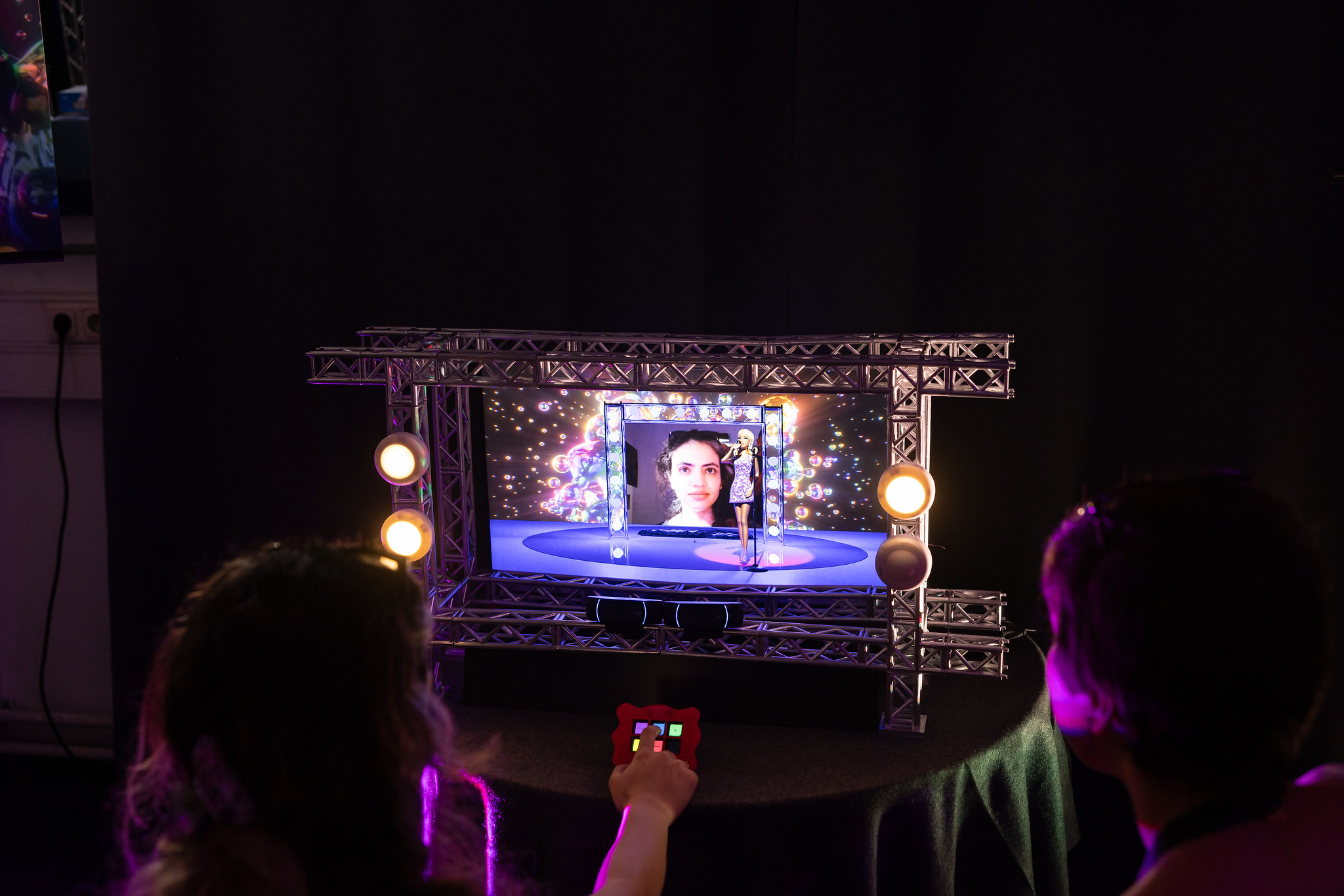Since 2002, Ars Electronica and the University of Arts Linz have joined forces to create an inspiring platform that showcases the talents of artists associated with international higher-education institutions pioneering innovative approaches to teaching media art and media culture.
Every year Ars Electronia and the University of Arts Linz invite a central international host university to present itself as a central partner directly in the exhibition space of the Kunstuni Linz on Linz’s main square. This year’s partner is the Taipei National University of the Arts (TW) from Taiwan.
This annual event, known as Ars Electronica Campus, is more than just an exhibition and takes place at the University of Arts Linz and at Post-City; it embodies the spirit of exploration and discovery, inviting outstanding universities from around the globe to present their projects and reflect on their mission and creative endeavors.
A total of 56 international universities working in the academic fields of media art, design and technology participate in the Ars Electronica Festival 2023. Through this collective endeavor, the Campus Exhibition celebrates the power of creativity, collaboration and exploration in shaping our shared future.
At the heart of the Campus format lies a profound commitment to exploring and visualizing diverse educational approaches in the realms of art and creativity. Through these showcases, we gain invaluable insight into the distinctive identities, histories, and contemporary practices of the invited guest universities. It is a unique opportunity to analyze and comprehend the evolving landscape of media arts and design education, where experimentation, collaboration and boundary-pushing are celebrated.
The Campus Exhibition stands as a testament to the power of interdisciplinary exchange and international cooperation, fostering a vibrant community of artists, educators and enthusiasts who collectively shape the future of media art and culture. As we delve into the works presented by these exceptional institutions, we embark on a journey of discovery, celebration and mutual inspiration.
-
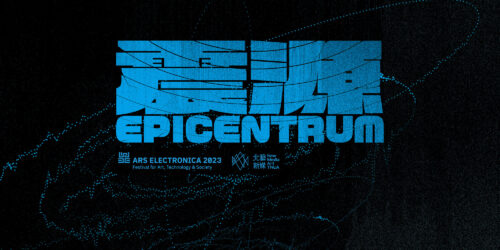
Epicentrum
Taipei National University of the Arts (TW)
When we look at our planet from the geological perspective of the Anthropocene, we see it as an ecosystem shaped by human activity, in which the layers of existence are closely interconnected and subject to vibrations. Epicentrum, an exhibition of electronics, reveals how organic and inorganic matter are interwoven and set in motion.
-
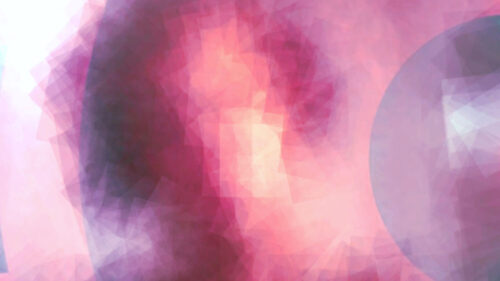
radical collectives
University of Arts Linz (AT)
radical collectives–a gesture that puts the spotlight on collectives and, above all, tests out their activist potential, but also, a possible answer to the question of who owns the truth.
-
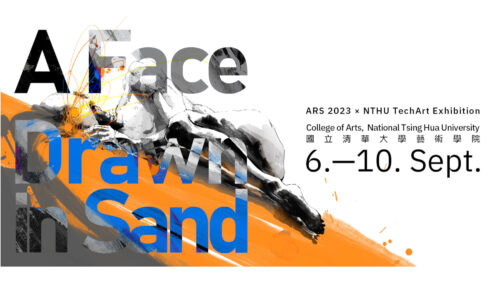
A Face Drawn in Sand
National Tsing Hua University (TW)
According to Foucault, the concept of modern „human“ is recent. If the „episteme“ changes, then „man would be erased, like a face drawn in sand at the edge of the sea.“ As AI reshapes human knowledge, will the definition of man disintegrate? Will anthropocentrism crumble, like a face in sand erased by waves? Will we,…
-
![Actuated Experi[ences|ments] vol. 1](https://ars.electronica.art/who-owns-the-truth/files/2023/08/header_photo-c-emilie-faracci-500x281.jpg)
Actuated Experi[ences|ments] vol. 1
University of Chicago, Actuated Experience Lab – AxLab (US)
AxLab’s work embodies the lab’s vision of “Actuated Experience” to engage human interaction via actuated technologies that are integrated into the future of our everyday spaces, toys and materials. The research prototypes invite human imagination and interaction to question “How would actuated technologies ‘actuate’ people?”.
-
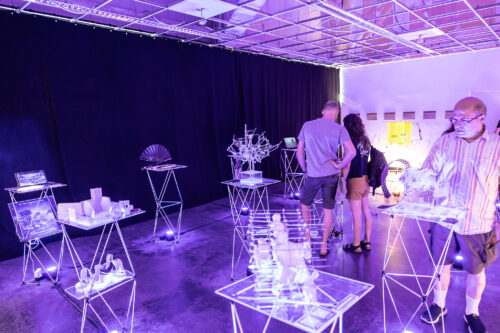
Agents of disruption and transformation
Design for Performance and Interaction, The Bartlett School of Architecture, University College London (GB)
Interrogating understandings of truth through a variety of design and research lenses, students from The Bartlett School of Architecture’s March Design for Performance and Interaction are showcasing a collage of design research centered around and interweaving ways in which we conceptualize issues as privacy, globalization, power (structures), identity or fact and fiction.
-
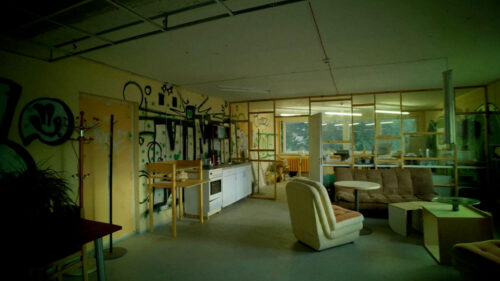
Alt Lab Tutorial Series
Institutio Media (LT)
Tutorial Series are for those interested in art and science solutions.
-

Artificialism
University of Applied Science Berlin, School of Culture and Design, Department of Communication Design (DE)
Artificialism is a child’s belief that objects or things are created artificially by humans or God. In the relationship between humans and Artificial Intelligence, it is unclear who is making assumptions and who is being created. Which is truthful: carbon or silicon? Who constructs our reality?
-
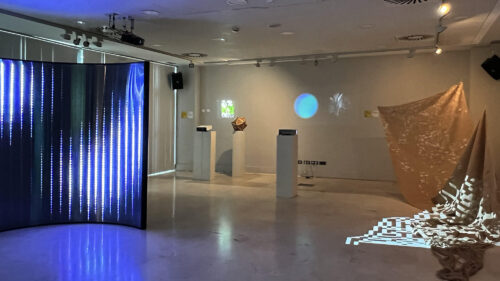
ASTER> Art ^ Science
University of Seville (ES)
ASTER’23: Co-creation blooms. Art and science intertwine. AI challenges the world. Nature in Anthropocene dance. SciArt whispers hope.
-
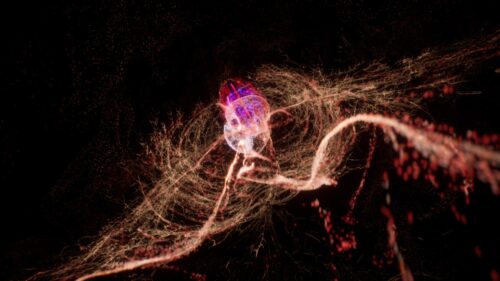
Back to the Roots and Up to Space
The Hong Kong University of Science and Technology (Guangzhou) (CN)
The exhibition explores human origins and cosmic aspirations through an artful blend of traditional forms and cutting-edge technology. From VR and bio-data to calligraphy and AI, this exhibition weaves a rich tapestry of our earthly ties and celestial pursuits, challenging perceptions and inspiring exploration.
-

Behind the wall
Ghazal Hosseini (IR), Hanif Haghtalab (IR)
Are scratched-out wall writings just an eyesore or are they vital messages? Behind the wall creates an AR portal, to show there is a life buried beneath the scratched words, revealing the message that the wall seeks to convey.
-
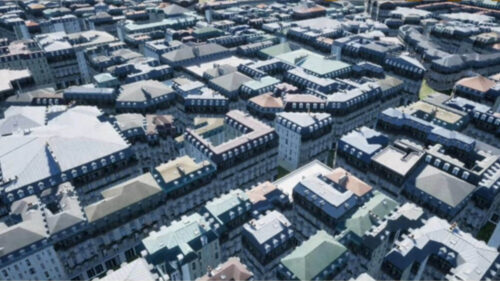
Beyond the Sight
Sungkyunkwan University | SKKU (KR)
We are living in a world filled with indiscriminate noise. These noises intertwine and obscure the truth, obstructing our path to reach the fact. We aimed to examine the elements that cover our sight amidst this noise.
-
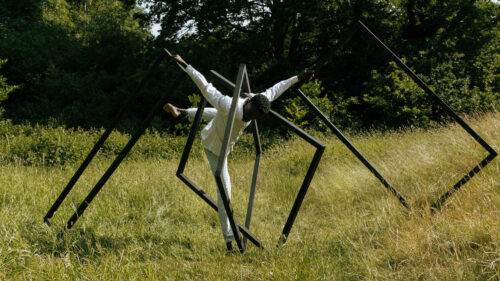
Body Machine Ritual
London College of Communication, University of the Arts London (GB)
Explore hybrid bodies, mythical machines and ritual approaches through new works from students of MA Interaction Design at UAL’s London College of Communication.
-

Butterfly’s Dreams: The New Aesthetic of AI in Artistic Practice
Nanyang Technological University (NTU), Singapore / Atelierhaus Salzamt
Butterfly Dreams: The New Aesthetic of AI in Artistic Practice explores how the latent qualities of Machine Learning allow interchanges between dreams and reality, and how it can be used to complement creativity in artistic practice and provoke dialogues on the role of machines in sense-making.
-
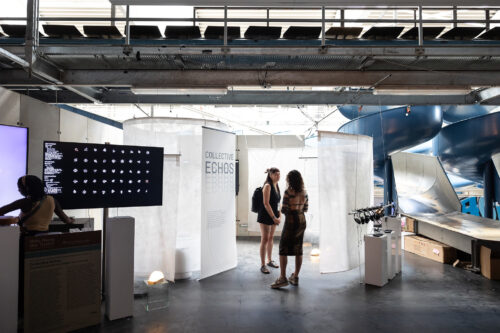
Collective Echos
MIT Center for Constructive Communication (US), Cortico (US)
Through an embodied, spatial audio experience, Collective Echos makes tangible the living library emergent from our ancient wisdom informed, AI supported social dialogue network, grounded in the telling of authentic life experiences. We invite the audience to listen and explore the breadth of our narrative collection through movement and accompanying visualizations.
-
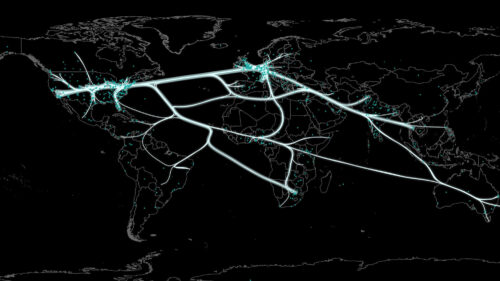
DEGENET
University of Salzburg (Paris Lodron Universität Salzburg) (AT)
DEGENET investigates the spread of conspiracy narratives in a complex geo-social media environment by analyzing semantic and spatial networks of actors in the Corona protest movement. Moreover, the project aims to uncover potential threat to society and democracy from dark communication networks of conspiracies. This interdisciplinary research combines communication science and geoinformatics at the University…
-
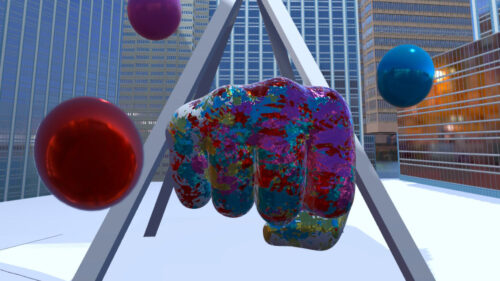
Detro Tune
College For Creative Studies (US), Graduate User Experience (UX) Design Program
The Detro Tune exhibition is conceptualized as an audio-visual virtual voyage through music history, subcultural anatomy and authentic City of Detroit identity.
-
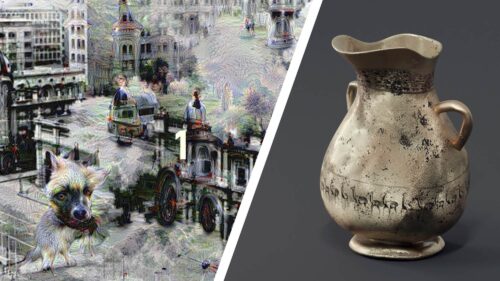
Diagramming History
Universidad Austral de Chile (CL) in collaboration with Universidad de Chile (CL), Universidad de Santiago de Chile (CL)
Using Artificial Intelligence (AI) tools, Diagramming History relates two ways of imagining history. The Neoliberal Dream proposes an algorithmic reading of the iconic image of the attack on the Palacio de La Moneda in 1973. Imagining loss addresses the possibility of digitally reconstructing part of the artistic heritage lost during the Pinochet dictatorship. While in…
-
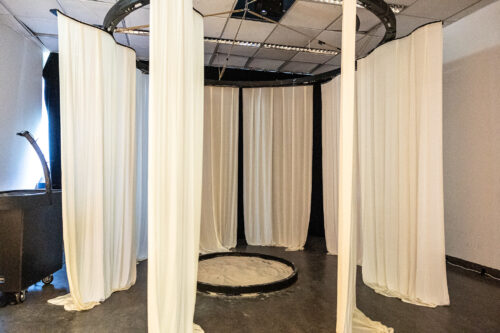
Digital Orbuculum
National University of Theatre and Film „I. L. Caragiale“, Master of Interactive Technologies for Performing and Media Arts (RO)
If there is a digital reality, is there also a digital truth? The digital world grows daily extending our interactions and worlds. Digital Orbuculum dives into digital reality looking for magical truth in its chaos.
-
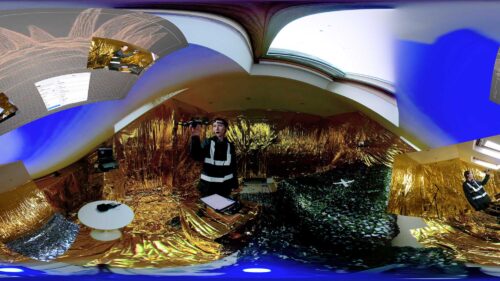
Digital Undercommons
Royal College of Art, School of Communication (GB)
The RCA’s School of Communication master’s and Doctoral students and research staff bring together two powerful and thought-provoking ideas: promoting data justice and parrhesiastic (truth-telling) embodiment in the contemporary technological landscape. Through the theme of Digital Undercommons, the work reveals the possibilities for the creation of critical positionalities that digital storytelling practices offer within the…
-

Dual Space
Musrara, the Naggar School of Art and Society (IL)
The Musrara School exhibition reflects the unique voices of its students, presenting a point of view that dismantles and rebuilds structures based on nature and culture. For this, tools and practices taught in Musrara are used, as well as unique personal languages where code and algorithm are used as a technique for disassembling and reassembling…
-
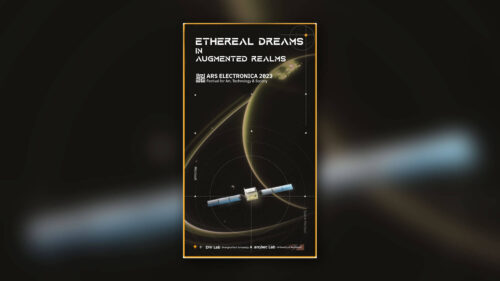
Ethereal Dreams in Augmented Realms
ShanghaiTech University (CN)
Using mixed reality, we examine diverse cognitive perspectives, offering immersive experiences that adapt to individual perceptions of reality.
-
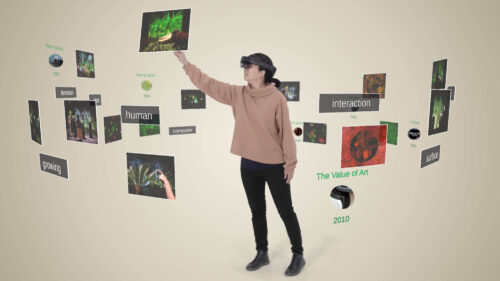
Expanding the Archive of Digital Art
University of Continuing Education Krems (AT), University of Arts Linz (AT), University of Applied Arts Vienna (AT)
The Archive of Digital Art (founded by Oliver Grau in 1999) has over the past three years been expanding with a focus on teaching, research and analysis of Media Art. Among others, innovative data visualizations, search and analytical tools have been developed in two current research projects at three universities.
-

Fantastic Smartphones
ECAL/University of Art and Design Lausanne, Bachelor Media & Interaction Design (CH)
Fantastic Smartphones – a series of interactive installations developed by students in Bachelor Media & Interaction Design at ECAL, investigating in a critical and offbeat way our relationship with smartphones and the way they influence our daily behavior.
-

Festival X Next Gen
Festival X (AE) in collaboration with The Dubai Institute of Design and Innovation (AE), New York University Abu Dhabi (AE) and American University of Sharjah (AE)
Celebrating the diverse narratives that contribute to our understanding of the truth.
-
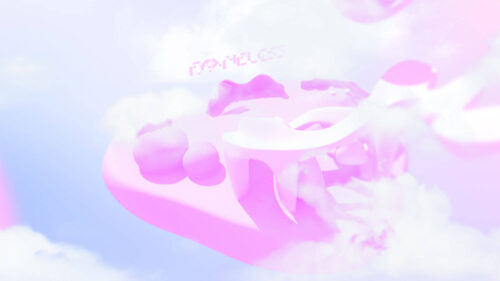
FRAMELESS
Korea National University of Art | K-ARTS (KR), Pohang University of Science and Technology (KR)
FRAMELESS: A unique convergence of art and technology in the metaverse, where virtual reality performances and artworks meet immersive multisensory experiences.
-
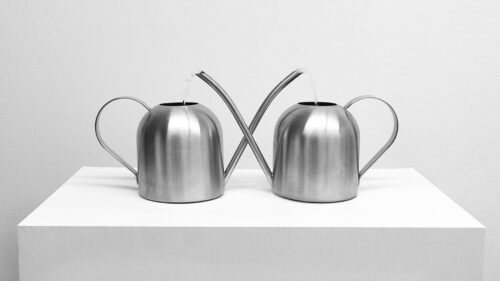
Funnel & Switch
School of the Art Institute of Chicago (US)
Funnel & Switch examines corporate capitalism’s subversion of ethical boundaries. The exhibition questions systems of ownership surrounding security cam footage, body imaging, heartbeat data, AI, cultural artifacts, and natural resources such as plant material and water. The artists explore these ethical dilemmas by investigating alternative dynamics for humanity.
-
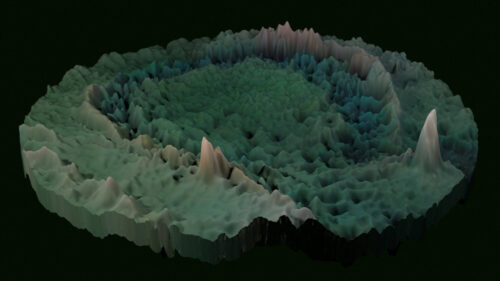
Future Ancestors
UC Chile (CL), University of Chile (CL), National University of Tres de Febrero (AR)
The study of our ancestral cultures presents itself as a respectful approach to our natural environment but is also a reminder of the challenges that we face in this new and hardly classifiable era that we often refer to as the Anthropocene, where almost every practice instantly becomes obsolete.
-
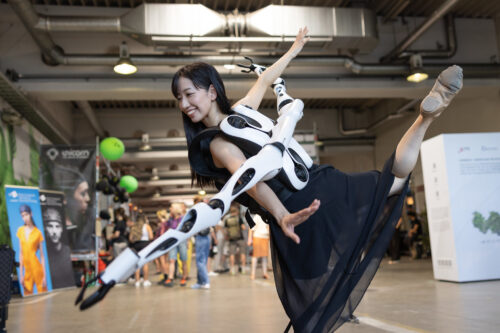
JIZAI ARMS
JIZAI ARMS project team (JP), The University of Tokyo (JP)
Half a century since the concept of a cyborg was introduced, digital cyborgs, enabled by the spread of wearable robotics, are the focus of much research in recent times. JIZAI ARMS is a supernumerary robotic limb system consisting of a wearable base unit with six terminals and detachable robot arms.
-
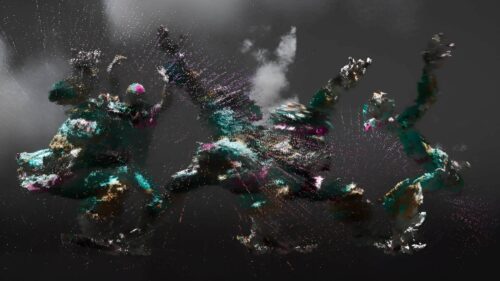
MA Design & Computation, New Practice in Art and Technology
University of the Arts Berlin (DE), Technical University Berlin (DE)
How do we engage with the rapid transformations caused by technological systems and their vast social and cultural effects? Virtual identities, spaces, infrastructures and models are becoming increasingly recursive, latching onto the physical and the metaphysical, inscribing their logics into bodies, landscapes, geopolitics and culture.
-
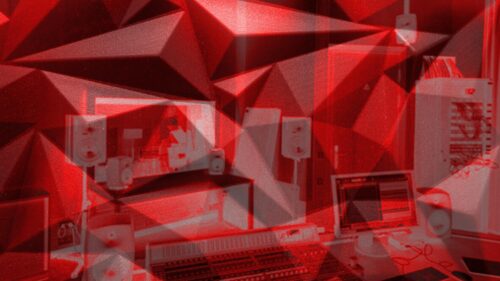
Manufacturing Audible Truth
Anton Bruckner Private University (Linz, Austria)
Since 2016 Anton Bruckner Private University has been hosting the Sonic Saturday as part of the Ars Electronica Festival. For this year’s festival we will organize an artists’ meeting to allow for an informal, hands-on, in-person exchange of ideas among artistic researchers working on relevant projects.
-
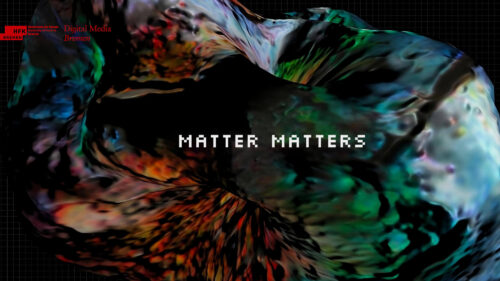
Matter Matters
University of Arts Bremen, Digital Media Program (DE)
Matter Matters presents seven projects from the Digital Media Program of the University of the Arts Bremen, dealing with the duality of matter as the substrate of technology and its mattering in society, in order to provoke new imaginaries and narratives by seeking for disruptions, indeterminacies, and poetics within technology.
-
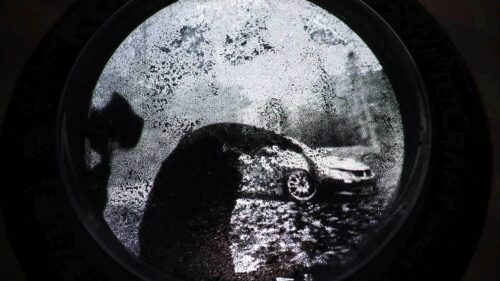
me ∞ us
University of Nova Gorica School of Arts (SI)
Reflection on ourselves and on us in the world. With great attention to community, to the present and to a shared future, but through individual stories that students interweave with each other, probing for their role in the world, sometimes with fear and uncertainty, but empowered in their exploration through mutual collaboration.
-
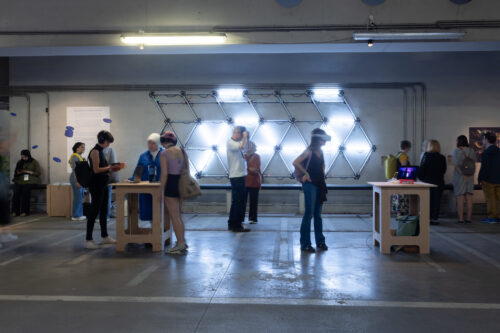
Meta-Functions of Cultural Production
Virginia Commonwealth University, School of the Arts in Qatar (QA)
Meta-Functions of Cultural Production presents a multidisciplinary exploration into the metafunctionality of cultural production and preservation. Reflective of the diverse creative and cultural ecosystems of Qatar and the larger SWANA region, the exhibition invites visitors to unpack meaning through cultural forms and contexts existing within systems of communication, behavior and interaction.
-
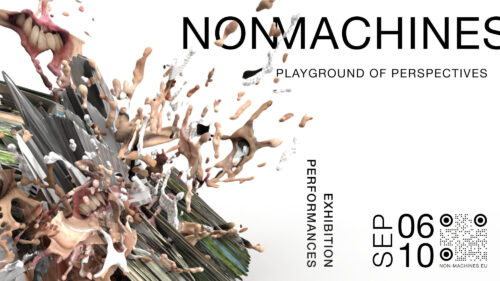
Non-machines: Playground of Perspectives
Bauhaus-Universität Weimar (DE)
The Faculty of Art and Design at the Bauhaus-Universität Weimar invites the public to the exhibition that prompts a change of perspectives and a re-exploration of the relationships between machines and „non-machines“.
-
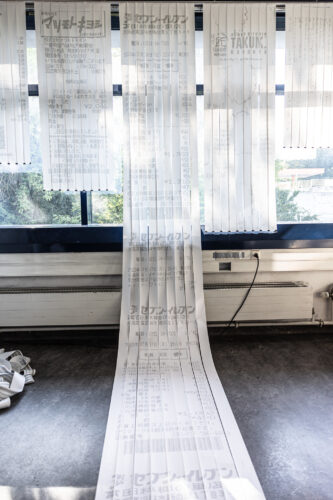
Possible Fiction
Osaka University of Arts (JP)
In imagining the future, it is important not to take things for granted. Forgetting what we thought was „impossible,“ we thought about how to „experience“ a „story“ that we thought was „possible“. Therefore, under the theme of Possible Fiction, works by student members of the Department of Art Science, Osaka University of Arts, will be…
-
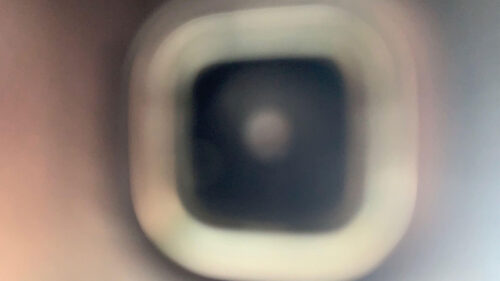
Program in Electroacoustic and Experimental Music (ELAK)
mdw University of Music and Performing Arts Vienna (AT)
Sound is immediately related to vibrating surfaces – one thinks of musical instruments and loudspeakers.The room installation Beyond the surface unites works that were created in this academic year –varying, abstracting, virtualizing the connection between visible surface and inherent sound. The surfaces are multiform: soft, hard, structured, smooth, vibrating, resting.
-
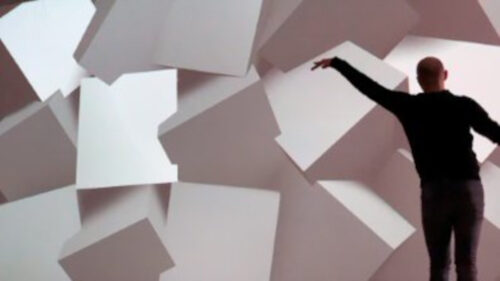
Reverse Manipulation
Babeș-Bolyai University, Faculty of Theater and Film (RO)
Reverse Manipulation makes reference to one of the most debated issues today: manipulation and the means to tackle it. Its double sense refers to different ways to counter (media) manipulation, but at the same time, it assumes manipulation as an artistic act. From AI to AR to VR to video, the works speak about the…
-
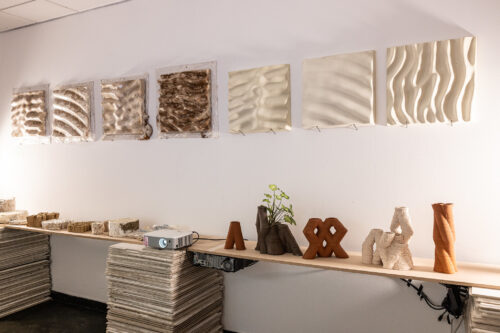
Revising the digital
UMPRUM Academy of Arts, Architecture and Design in Prague (CZ)
Project Revising the Digital – Environmentally Conscious Strategies of Design, Materiality and Fabrication is a mosaic of loosely connected student projects aimed at exploring what it is to be a designer in the world of scarcity and digitalization. Furniture prototypes, material tests and digital installations invite the visitor to the world of doubts, concerns, visions…
-
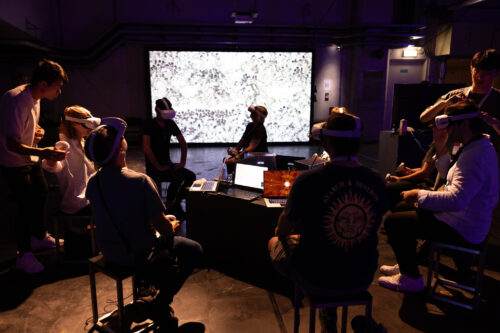
Spot On MozART
Mozarteum University (AT)
What do you see when you’re listening? Spot on MozART is an inter-university, interdisciplinary project devoted to visual research into how we listen, and thus to a (new) understanding of the music of Wolfgang Amadeus Mozart in the 21st century.
-

The Anatomy Lessons
HSLU – Lucerne School of Art and Design (CH)
What is the human responsibility for artificially created (partial) intelligences? How would an ideal AGI be designed? What societal values and norms will it be guided by?
-
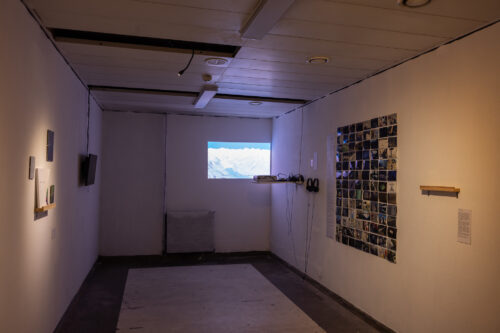
The Loot Bag Theory of Fiction
University Research School ArTeC, Paris 8 University Vincennes – Saint-Denis, TEAMeD Research Lab (FR)
The Loot Bag Theory of Fiction is a direct reference to Ursula K. Le Guin’s essay The Carrier Bag Theory of Fiction in which she suggests that bags and containers instead of weapons are the first survival objects in human history (Le Guin, 1986). In the hollow of our bags, we can find the loot…
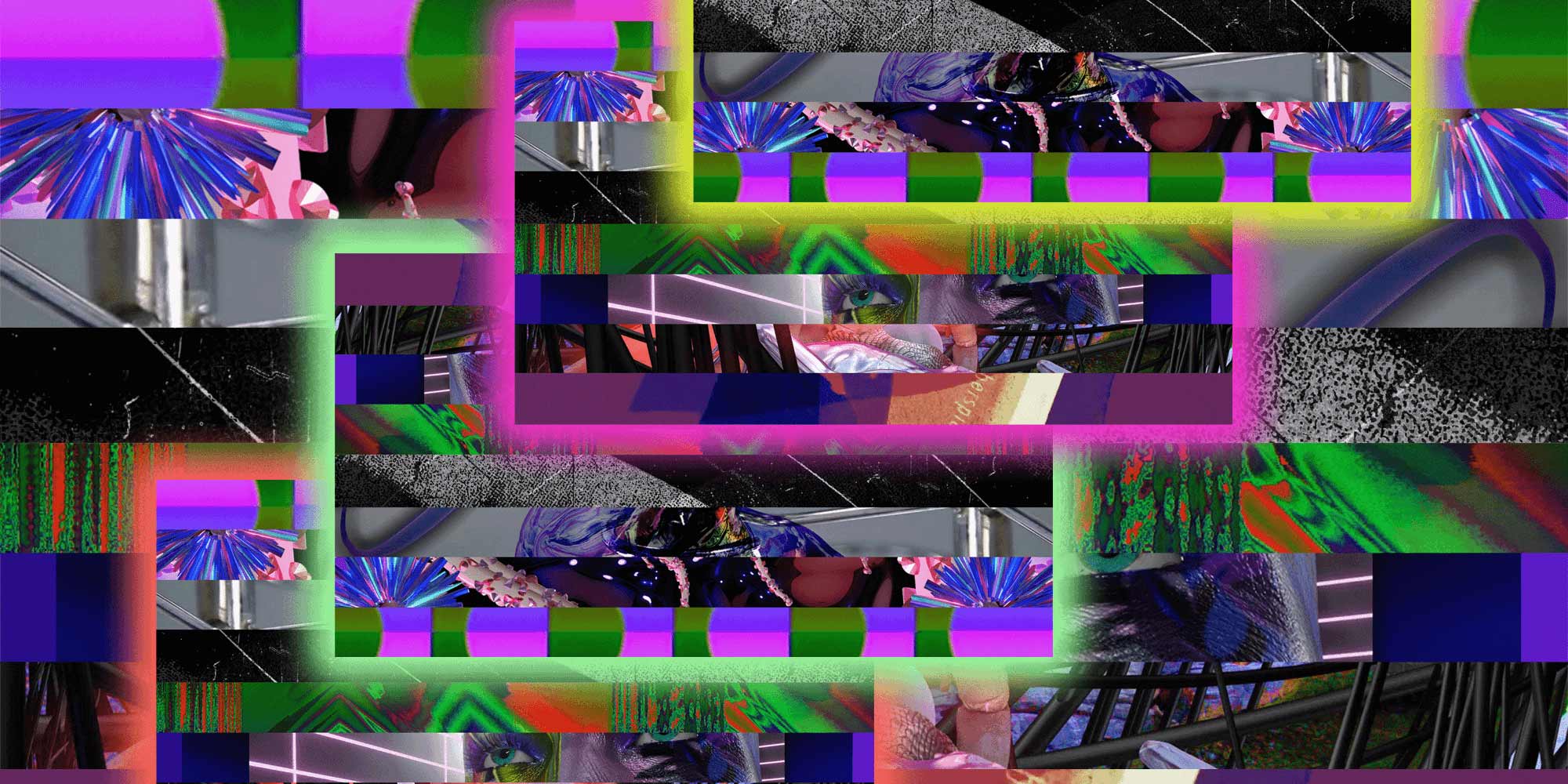
As an International Collective Towards the Future
In the anniversary year of the University of Arts Linz, the Campus Exhibition once again invites visitors to reflect and admire many international contributions and original, contemporary as well as inspiring works.
This year, the University of Arts Linz celebrates its 50th anniversary with a special theme—Radical Collectives. In response to the festival question „Who owns the truth?“, the University explores the activist potential of collectives, questioning and testing their role. The theme metaphorically signifies that the search for truth involves encountering a diversity of people and opinions, emphasizing negotiation and jointly discussing content over individual perspectives. By embracing diversity and collective approaches to resources, knowledge and skills, the University seeks to understand and address the many challenges of today and the future.
In 2023, the Campus also places a special focus on the partner university in Taiwan, the Taipei National University of the Arts, whose exhibition, Epicentrum, fits perfectly with the University of Arts Linz’s anniversary motto and the festival’s theme. The exhibition reveals how organic and inorganic matter is interwoven and set in motion, drawing connections to Taiwan as an epicenter in a tense global situation and geologically positioned at the intersection of two tectonic plates.
The University of Arts Linz is also represented in the POSTCITY with the Interface Cultures exhibition, created by the students of the course with the same name. Under the motto „Resonating Selves,“ the exhibition delves into our interaction with the world, both real and digital, and the clash between subjective and objective reality.
At the Salzamt during the Ars Electronica Festival, contributions from another partner university, the Nanyang Technological University, Singapore (NTU), are showcased. The exhibition, subtitled The New Aesthetic of AI in Artistic Practice, explores how AI can foster creativity and change the way we create and experience art.
